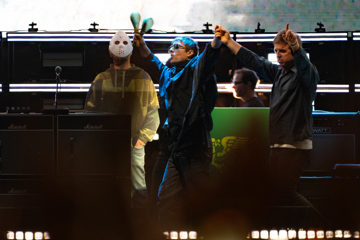'The Mummy' Is Instantly Forgettable And Genuinely Lamentable
Russell Crowe with a cockney accent will shake you to your very core.
THE MUMMY

Things are about to get dark. Really dark. Universal has unveiled its Dark Universe series, with the first film of this corporate-planning-meeting-born, interlocking IP-orgy the Tom Cruise-starring, directed-by-a-former-Transformers-writer reboot of The Mummy. Sounds pretty fucking dark, right. But, oh, you innocent fool, you have no idea the darkness that lurks herein. I’m not talking about the mooted revival of The Creature From The Black Lagoon and/or The Bride Of Frankenstein. I’m talking about something so dark, so disturbing, so horrifying, that it will chill your very blood, and shake you to your very core. Russell Crowe with a cockney accent.
Forget, for a moment, the fact that, less than a decade removed from 2008’s unassailable classic of the cinematic medium, The Mummy: Tomb Of The Dragon Emperor, this barely-napping franchise has been reborn and rebranded, with everyone’s favourite Operating Thetan —who, rest assured, has a sequence herein where he runs really fast— out front.
Don't miss a beat with our FREE daily newsletter
Because, ol’ Rusty Rabbitoh is the thread that binds this Dark Universe together, and he serves as narrator of this Mummy, weightily intoning its fantastical nonsense in booming voice, with theatrical relish (“welcome to a new world of Gods and Monsters!”).
Crowe shows up, too, herein, as head of some shadowy underground concern in the business of Evil, their top-secret lair (which has lots of employees, and I wonder, as ever, if they’re full-time or freelance, well-paid or conscripted into service) filled with monster skeletons floating in formaldehyde. He wears natty suits and speaks in a posh accent, and carries himself as a tweedy Professor, his trafficking in Evil merely acquiring knowledge in his field of study. His name, it turns out, is Dr. Henry Jekyll, which he speaks aloud with due aplomb, to let you truly soak in just how audacious —and idiotic— this whole Dark Universe cinematic-marketing-meeting is.
He keeps an evident temper under wraps via periodic injections of some magical serum; but, oh, when denied his fix, he cannot keep the ultraviolence at bay. “It’s me, yer good mate Eddy Hyde!” he chirrups, once transformed, just to, again, remind you of the great gathering of Universal-owned but public-domain properties. And Crowe does so in the worst cockney accent heard on screen since Dick Van Dyke in Mary Poppins, prancing and mugging like he’s in a local theatrical production of Lock, Stock & Two Smoking Barrels. This multi-accented split-personality turn is the worst kind of classism in regards to ‘evil’ imaginable: that goodness and learning are the province of refined, upper-crust toffs, but violence and mayhem belong to the lower classes.
Crowe’s turn is, in many ways, inessential to The Mummy, but every time he shows up you’re reminded that you’re not just watching a movie. Instead, you’re watching the first piece in some monster-movie-manic response to the Marvelisation of Hollywood cinema. Rebooting The Mummy is suspect enough under its own terms, but the promise of a whole interconnected ‘universe’ of middle-aged men —Johnny Depp as The Invisible Man and Javier Bardem as Frankenstein are on deck— weighs heavily on what’s, at best, a light-and-fluffy popcorn-movie.
Vodka Cruiser and Comic Relief Jake Johnson play a pair of Indiana-Jones-esque rogues, reconnaissance soldiers that’re small-time looters; out to filch fenceable jewels from Mesopotamian crypts in Middle Eastern conflict zones. When they get in a firefight with local guerrillas, and dodge detonating explosives, it’s played, somehow, for “laughs”; especially when it ticks off their Angry Black Captain, Courtney B. Vance. Their paths cross with Annabelle Wallis’s Ancient Egyptian Archaeology Expert, who’s secretly in league with Rusty’s league of extraordinary specimens (and employee dental plans). It’s soon revealed that Cruise and Wallis banged the night before we meet them, meaning the generic sexual tension is bantered about from beginning.
Speaking of sexual, things get mega-erotic when they disturb the crypt (“it’s not a tomb… it’s a prison!”) of a mummified Egyptian Princess, who, once awakened from her multi-millennia nap, haunts Tommy C with visions of her curvaceous naked buttocks striding across generic Arabian-harem backlot sets; cooing that Cruise is her “chosen one”, her goal to penetrate him with a phallic black dagger topped by a glowing ruby-red glans. When she finally gets her hands on him, she kisses him, puts her fingers in his mouth, caresses his rock-hard abs.
In short: the film is not just about Cruise choosin’ between Good and Evil, but two sexually-available women personifying them. Here, again, there’s a subtext just as creepy as Crowe’s Jekyll/Hyde accents: Good is embodied as a white, blond, Anglo-Saxon damsel in a white shirt (which leaves her, for the whole final reel, essentially acting out an extended wet t-shirt contest); Bad is a dark-haired, tattooed, ethnic temptress who’s arisen from modern-day Iraq.
Cruise’s character arc is familiar from countless Tom Cruise movies. He starts out as a raffish, charismatic, womanising prick, a cocky Alpha Male who cares only for himself. And, yet, over time, he learns to care about others, puts the fate of the planet in his hands, and sacrifices himself for some greater cause. With all of these countless Cruise movies, there’s a meta-text there, about self-conceit and self-conception, about how his many cinematic planet-saving visions are an actualisation of his KSW ways.
This is all, of course, a lot to take in: Cruise both unleashing and becoming a human embodiment of Ancient Evil; Rusty Crowe doing Jekyll/Hyde with panto relish; buying a ticket like signing up to some instalment plan of shitty tentpole re-dos of old monster movies (it’s here that we may note, Universal has tried this shit before, with Van Helsing, The Wolfman, and Dracula Untold, all of which stunk, then sunk).
But, really, that recap of competing interests only scratches the surface of everything that’s going on here. The Mummy also: turns the guy from The New Girl into a one-eyed ghost corpse who cracks wise from beyond the grave; unleashes a horde of hyper-speed, 28 Days-esque zombies that enjoy leaping into moving vehicles and swimming underwater; stages a bonkers plane-crash in which a fleet of cod-Hitchcockian crows takes down a military plane (insert your best Sully jokes here); and brings back the franchise’s Giant Dustface, only, this time, it hovers over London Bridge, scaring Big Ben out of his trousers.
The tone lurches, wildly, from low-brow to lower-brow, B-movie to CGI spectacular, supposed study of good-and-evil to smirking sex-comedy; with horror and spy-movie tropes on loan. It’s a wild, ridiculous rumpus, an utter mess, a film that can be appreciated only for its camp factor. That a whole movie-verse is banking on its success seems like a recipe for disaster. Just as Rusty’s Evil Emporium is littered with the bones of fallen monsters, Hollywood is becoming littered with the dashed dreams and decaying corpses of various multi-saga wannabes. The Mummy may soon join them: the film instantly forgettable, and genuinely lamentable.
MY COUSIN RACHEL

“Did she? Didn’t she?” The first words narrated in My Cousin Rachel immediately set a tone of unease, disorientation, debate; the mystery of its titular character persisting ’til the last. Adapting Daphne du Maurier’s novel of the same name —last brought to screen in a Richard Burton-starrer in 1952— writer/director Roger Michell (yes, the Notting Hill guy) milks the expert plotting of the novel, and the unreliability of narrator, protagonist, and antagonist. Sam Claflin plays an old-timey, pre-electricity orphan in Cornwall, whose father-figure heads off to Italy in ailing health; and, via a series of letters home, writes of falling in love with his half-Italian cousin, and, then, slowly, of an increasingly-paranoid suspicion that she is trying to poison him. When he dies, Claflin heads to Florence, but arrives to find this mystery woman vanished. For the whole first act, this titular cousin is spoken of, but never seen; Michell delightfully delaying the moment in which she’ll first be glimpsed.
She, eventually, makes her wall to the Cornish seaside, where Claflin now is the master of his land. He’s ready to read her the riot act, and is expecting a monster. But, instead, he meets Rachel Weisz, employing every ounce of her movie-star charisma in a role rippling with complexity, doubts, layers. She instantly charms everyone; from Claflin, to the servants, to the local vicar, to the dogs. Everybody Loves Rachel! Soon enough, Claflin ain’t thinking with his right mind, just his dick. But is she as delightful as she appears to be? Or a conwoman seducing a clueless kid, out to grift him of his inherited plenty? And what is with those herbal teas she keeps brewing him?
My Cousin Rachel is, in such, effectively a paranoia-thriller; with audiences forced to make up their own minds as to whether or not Claflin’s lovelorned delusions, and then mounting suspicions, are just all in his head. It’s paranoia born of wealthy-male-anxiety, about being victimised by a conniving woman, but there’s a critique of the demonisation of women lingering therein, too. Michell remains a mediocre director —lord, can we please retire the ‘pearls bouncing in slow-motion’ trope— yet he understands the source text well, and shoots enough scenes in evocative shadow to create a mood. It’s not inspiring stuff, but sometimes ‘perfectly-serviceable’ is enough.
RISK

With Citizenfour, Laura Poitras observed history on-the-ground, and in-the-moment: her hotel-room rendezvous with Edward Snowden four days that would shake the world. With its sister picture, Risk, history sprawls out over years: its isolated instances of documentary observation like islands in the great stream of time. Here, the filmmaker is communing with that other iconic disseminator of US military secrets, Julian Assange; the celebrity subject seen at intimate proximity. “I cannot believe what he allows me to film,” Poitras marvels, in early voice-over, and we see Assange admitting he has a God Complex, getting his haircut in WikiLeaks’ sharehouse kitchen, tooling about the Ecuadorian embassy in an ill-fitting bathrobe, talking extemporaneously with his lawyers about how he thinks a potential rape trial may go, and making jokes about sex scandals being good for publicity.
Part of Poitras’ disbelief comes because Assange is, otherwise, utterly suspicious; living life as if in a paranoia thriller. The surprising moments of quotidian domesticity are off-set by what play like spy-movie tropes: Assange speaking in code-names, burning records, rendezvousing in remote woods; his escape to the Ecuadorian embassy coming after he dyes his hair and beard, applies fake-tan, coloured contact-lenses, and ear-gauges. Sam Esmail serves as an executive producer on the film, and, at times, Risk’s reality bumps up against Mr. Robot’s fiction. And, when Lady Gaga shows up to interview Assange, lines of reality are obliterated; the circus turning surreal.
Yet, everything changes when Poitras is contacted by an “anonymous source” from the NSA, and heads to Hong Kong to meet her guy. Assange feels “betrayed” that the documentarian collaborates with journalists from The Guardian and The Washington Post, rather than dumping Snowden’s intel out via WikiLeaks. They have a falling out, only Assange tells Poitras not to tell people they’ve had a falling out. Three years pass, and, then, the once-intimate moments become grander, at-a-distance markers of recent news: the Hillary leaks, Comey in Congress talking about Russia and Trump, Chelsea Manning released from prison. In such, Risk lacks the tautness of Citizenfour, and doesn’t feel much like a triumph. But, this is the way history happens: sometimes befitting a contained narrative, othertimes a scattershot sprawl.
KEDI

Kedi is Turkish for cats, and the subjects of Ceyda Torun’s beloved documentary are a host of felines; seven of the hundreds of thousands of street cats that wander through Istanbul, sharing the city with the people who live there. Whether gregarious or shy, aggressive or passive-aggressive, fearsome or cutesy, the cats in Kedi are movie characters as memorable as any humans you’ll see on screen.
Torun’s camera gets down to a cat’s level, moving through Istanbul’s streets and alleys, tailing its stars as they search for food, affection, adventure. But she also puts her camera on observationist high, evoking the autuer’s use of the eye-of-God overhead. This suggests what becomes the film’s thematic grist: cats, and human’s relationship to them, suggestive of the spiritual, of, to some fervent believers, Godliness. It’s a sweet, sunkissed rumination on what the relationship between man and animal says of our nature; the freedom and liberation of Istanbul’s cat population portraying their human co-habitants in a flattering light.
GRADUATION

Parental sacrifice, in cinema, is often blindly heroised: the hero who'd do anything for their kid —including, say, killing endless reams of people— shown as being, somehow, virtuous or noble, no matter how ill their deeds. This trope is placed under the microscope in Graduation, the latest film from Romanian master Cristian Mungiu. Here, a Romanian doctor (Adrian Titieni, from The Death Of Mr. Lazarescu and Child’s Pose) is endlessly proud that his daughter (Maria Drăgus), has been accepted into a British university; this another patriarch for whom every success of the child is a reflection on the father.
Yet, when he drops daughter-dear off for a final exam, she is the victim of an attempted sexual assault; Mungiu, in a fashion reminiscent of Asghar Farhadi, not showing this dramatic moment, thereby increasing audience confusion, and anchoring the narrative's perspective with that of the father. The traumatic experience causes Drăgus to flunk an exam, and lose interest in schooling; but Titieni, horrified at the potential loss of status points —and all his ‘sacrifice’ going to youthful waste— attempts to use his influence, and a few reciprocal back-scratching favours, to get her preferential tertiary-admissions treatment.
It's this moral choice that, as in a noir film, starts him on a slippery slope; our supposed hero descending into ethical compromise, sinking evermore into morally-murky mire. Whilst Graduation isn’t as successful as Mungiu's prior masterworks, 4 Months, 3 Weeks, 2 Days and Beyond The Hills, once again the director depicts how a corrupt society corrupts its citizens, personal values bent by the crookedness of its systems of power. Here, the dream of an English Education —as escapism, as status symbol, as condemnation of Romanian reality— is used as satirical totem; the dark, depressing drama enlivened with a sense of irony by a kind of post-Communist cultural cringe.






